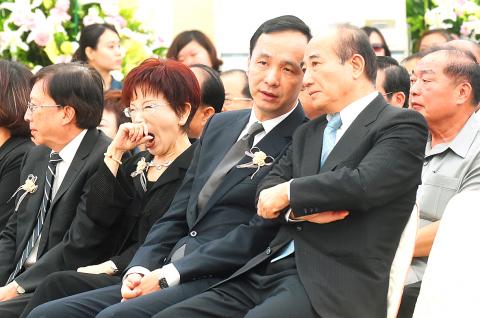The Democratic Progressive Party (DPP) yesterday urged Chinese Nationalist Party (KMT) Chairman Eric Chu (朱立倫) to clarify the KMT’s stance on cross-strait relations, as KMT presidential hopeful Hung Hsiu-chu (洪秀柱) has criticized President Ma Ying-jeou’s (馬英九) cross-strait policy and appears to be heading in a pro-unification direction.
“Hung seems to be taking a very different view on cross-strait policies from those of Ma and Chu, and actually Taiwanese are still struggling to understand how she actually thinks,” DPP spokesperson Wang Min-sheng (王閔生) told a news conference at the party’s headquarters in Taipei. “[Cross-strait policy] is a very serious issue and therefore Hung and the KMT are obliged to explain it clearly to the public.”
The deputy legislative speaker has criticized Ma’s “one China with different interpretations” and “no unification, no independence, no use of force” as his main principles in cross-strait relations, saying that such ideas would eventually lead to Taiwanese independence, so she said that the two sides should agree to “one China, same interpretation.”

Photo: Liao Yao-tung, Taipei Times
“Hung did not explain what ‘same interpretation’ means, or clearly what she meant by ‘one China,’” Wang said.
He said that while Hung last month said that Taiwan and China are two Chinese governments under “one China,” on Monday she said in an interview that her idea of “one China” is asking the People’s Republic of China to recognize the existence of the Republic of China.
“As a presidential hopeful, Hung should make herself clear about the issue to the people,” Wang said.
As next month’s KMT national congress is set to pass a new political agenda, Wang questioned whether Ma’s “one China with different interpretations,” Chu’s “both sides belong to ‘one China’” or Hung’s proposal of signing a cross-strait peace agreement under “one China, same interpretation” would be written into it.
“Is the KMT going to be switching to the direction of pushing for accelerating cross-strait unification? This is a question that Chu should answer,” Wang said.

Conflict with Taiwan could leave China with “massive economic disruption, catastrophic military losses, significant social unrest, and devastating sanctions,” a US think tank said in a report released on Monday. The German Marshall Fund released a report titled If China Attacks Taiwan: The Consequences for China of “Minor Conflict” and “Major War” Scenarios. The report details the “massive” economic, military, social and international costs to China in the event of a minor conflict or major war with Taiwan, estimating that the Chinese People’s Liberation Army (PLA) could sustain losses of more than half of its active-duty ground forces, including 100,000 troops. Understanding Chinese

The Ministry of Foreign Affairs (MOFA) yesterday said it is closely monitoring developments in Venezuela, and would continue to cooperate with democratic allies and work together for regional and global security, stability, and prosperity. The remarks came after the US on Saturday launched a series of airstrikes in Venezuela and kidnapped Venezuelan President Nicolas Maduro, who was later flown to New York along with his wife. The pair face US charges related to drug trafficking and alleged cooperation with gangs designated as terrorist organizations. Maduro has denied the allegations. The ministry said that it is closely monitoring the political and economic situation

UNRELENTING: China attempted cyberattacks on Taiwan’s critical infrastructure 2.63 million times per day last year, up from 1.23 million in 2023, the NSB said China’s cyberarmy has long engaged in cyberattacks against Taiwan’s critical infrastructure, employing diverse and evolving tactics, the National Security Bureau (NSB) said yesterday, adding that cyberattacks on critical energy infrastructure last year increased 10-fold compared with the previous year. The NSB yesterday released a report titled Analysis on China’s Cyber Threats to Taiwan’s Critical Infrastructure in 2025, outlining the number of cyberattacks, major tactics and hacker groups. Taiwan’s national intelligence community identified a large number of cybersecurity incidents last year, the bureau said in a statement. China’s cyberarmy last year launched an average of 2.63 million intrusion attempts per day targeting Taiwan’s critical

‘SLICING METHOD’: In the event of a blockade, the China Coast Guard would intercept Taiwanese ships while its navy would seek to deter foreign intervention China’s military drills around Taiwan this week signaled potential strategies to cut the nation off from energy supplies and foreign military assistance, a US think tank report said. The Chinese People’s Liberation Army (PLA) conducted what it called “Justice Mission 2025” exercises from Monday to Tuesday in five maritime zones and airspace around Taiwan, calling them a warning to “Taiwanese independence” forces. In a report released on Wednesday, the Institute for the Study of War said the exercises effectively simulated blocking shipping routes to major port cities, including Kaohsiung, Keelung and Hualien. Taiwan would be highly vulnerable under such a blockade, because it